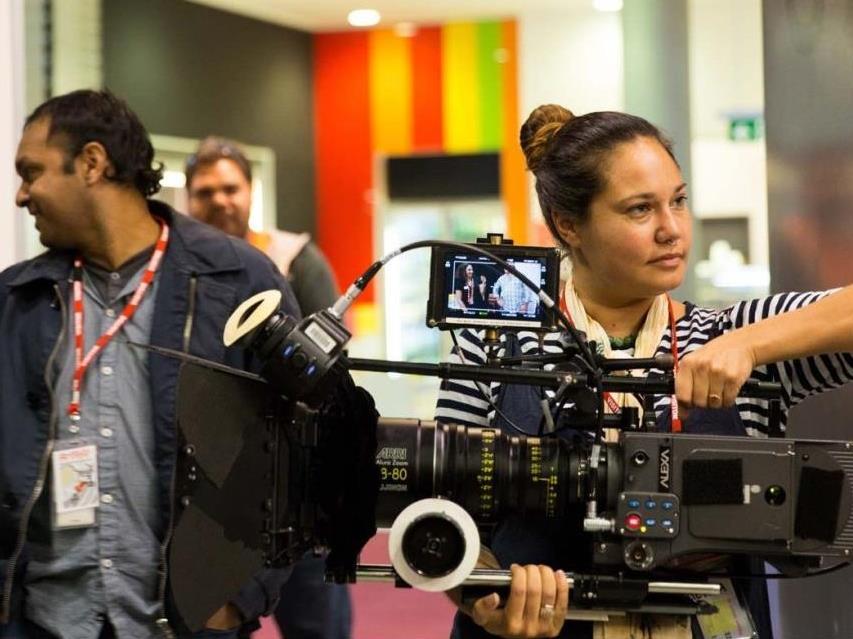Here is the inspiration: Devina McPherson at the 2016 AFTRS black shot workshop, AFTRS Indigenous Program. Shot by Lauren Middleton for DL Photography.
When Neil Peplow took over as head of the Australian Film Television and Radio School, he brought an agenda about diversity and social justice which fitted neatly with a rising tide of frustration about an elitist industry.
He had an extremely pragmatic approach to build detailed courses which fitted the needs of students. They were to be the right material at the right level, tailored so students could work part time.
With these criteria, the existing diploma and advanced diploma courses were evolved further to encourage access by students of diverse backgrounds, financial support and genders.
Out go the courses
Now – bang! – almost all the diplomas have gone, replaced by short, sharp modules of guerilla learning, the industry certificates and industry short courses. Neil Peplow has resigned to take up a senior role in the UK as the British Film Institute’s Director of International Affairs, to guide the sector into the post-Brexit landscape.
Unfortunately those idealistically re-crafted courses collided with bureaucracy. As an Institute for Higher Learning, AFTRS does not have the full problems of a university but it still has to negotiate with TEQSA, the Tertiary Education Quality and Standards Agency. It wants a standardised volume of delivery hours, while the screen sector needs short, sharp skills training.
Just as bad, AFTRS is caught in the staff freeze throughout the government sector, and is being eroded by the annual demand for an efficiency dividend.
In the end, says Nell Greenwood, the Director of Curriculum and Student Registrar, ‘The graduate certificate and diploma courses have been suspended, because we got to the point where we were offering too much and the faculty was overheating. We swallowed the pill that we couldn’t be all things to all people.’
Instead, she says, ‘We should do what we do best, which is full time immersive teaching in a small stable of courses and then build our other offerings. We wanted to consolidate the three main courses and do them really well.’
The majority of the material offered in the old diplomas and certificates has been turned into more focused industry endorsed short courses and certificates, which AFTRS controls – but have to be delivered within the staffing limits.
The truly short courses, usually one or two days and aimed at specialised information or entry people, has been a staple of the school almost since it began. This Open Program still exists, though it is now simply called Short Courses and runs in partnerships. It is joined by a new suite of Industry certificates.
Defending the core
However, the school continues to offer the part time masters’ degree in screen business and leadership and is strengthening that component of the degree program. Head of Producing Peter Herbert says, ‘We are going from strength to strength. I think the school and the industry has recognised the value of this course. We are trying to grow the pie and that is what people are interested in.’
The graduate diploma in radio is still offered in a part time version.
The rest of the Masters program is defined as a full time course, designed to enable screen creators to move into Heads of Department roles, over ten different disciplines.
Roland Gallois, the Head of Editing, says that ‘Money is a big issue – an equality issue, which we are trying to address. Fees are high in any screen course anywhere and we are also conscious of the time commitment.’ Unfortunately those diploma and certificate courses were valuable precisely because they could be structured to allow students to work part time.
Greenwood argues that the school has not abandoned its commitment to democratising the screen sector. ‘Access and diversity are extremely important. We are really committed to that. We have a scholarship program and we are working really hard to find plenty of options to provide support.’
The masters courses are designed to be intensive, to demand commitment and run on merit entry. They are not quite the full time programs that they seem to be. Cameron Patrick, Head of Music, says ‘Most of our students work. We have structured the two year masters so that the first year is only face-to-face from Monday to Wednesday and on Thursday and Friday in the second year. It is a huge ask – most people have families and other commitments.
Editor Gallois runs a similar strategy. ‘We try to help by limiting classes to the first three days of the week, so they have four days to get a job, manage their lives and deal with accomodation.’
The time pressure looks tough. Sequin in a Blue Room, directed by Samuel Van Grinsven at the school, worked with composition student Brent Williams, who delivered fifty minutes of music. The film is in the Sydney Film Festival and is travelling with a buzz of excitement.
Aiming for excellence
The demands of merit entry are serious but as practical as possible. In music, the students may have a bachelor’s degree in an instrument or composition. They certainly have to read and write music, and submit portfolios in which the written scores are integrated with pictures.
‘We have an interview process,’ Patrick says. We want to know how they are set up mentally to jump into collaboration. The software they are here to learn. We are looking for people who can write music already but we want to take those skills and apply them to writing for film, and collaborate with other creatives.’
To Roland Gallois, ‘Editing is ninety percent energy, commitment, drive and sheer hard work. If students can demonstrate that, if they have made their own films or been employed in the sector, the decision becomes an imperfect science.’
He values people skills, the ability to absorb feedback, to tell a clear story to evoke emotion. ‘Emotional accuracy is important. I hope students bring it and try to select carefully. It is an element of talent but i don’t know if you can teach sensitivity, or if you can teach imagination. But there are certain techniques to help people and that is what we excel at.’
‘We are just committed to staying the course and committing to excellence,’ says Nell Greenwood. ‘We engage strongly with creativity as a human process, where people nurture their own ways of working.
Creative wellbeing
‘More and more we are looking at mental health issues, and developing a sense of what creative wellbeing looks like. The space of being here in person with other human beings in a room materially and physically with a leading practitioner – for us that remains a powerful and transformative educational experience.’
That sense of community has been essential to the DNA of AFTRS since it was created. There are years and pockets and schemes where it has failed, but when it works it looks just like all the good film schools – bunches of students bonded together to make great projects, to change with the times and embrace new ways of working.
Right now, that aspiration is essential to thriving rather than surviving anywhere in the screen sector. A huge wave of practical experiment will turn into a spreading hunger to learn.
———-
AFTRS has now had its TEQSA
This is how AFTRS describes the Masters of Arts Screen program.
The Master of Arts Screen is a hands-on transformative learning experience. The two year, full-time degree is designed to enable the future creative leaders of the industry and fast-track screen professionals into head-of-department positions. This course, available in 10 disciplines – animation, cinematography, directing, documentary, editing, music, producing, production design, screenwriting and sound – offers shared subjects, deep discipline learning and cross-disciplinary projects to allow you develop a dynamic and multi-faceted skill-set. An ongoing cycle of practical collaborations enables you to hone your skills, apply creative thinking to real-world scenarios and develop life-long partnerships. The course culminates in a funded, major creative work.
The School is currently running the Masters Tasters series around the country, to give prospective students an opportunity to learn about the Masters program.





